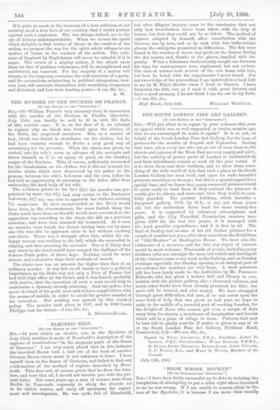THE MURDER OF THE DUCHESS DE PRASLIN.
[TO THE EDITOR OP THE " SPECTATOR."] Sin,—Sir William Fraser's very uncanny story in connection with the murder of the Duchess de Praslin (Spectator, July 15th) can hardly be said to fit in with the facts of this terrible case. It is, on the face of it, an attempt to explain why no blood was found upon the clothes of the Duke, the suspected murderer. But, as a matter of fact, blood was found in abundance on his clothes, but he had been cunning enough to devise a very good way of accounting for its presence. When the alarm was given, he rushed into his wife's room in advance of the servants and threw himself, as if in an agony of grief, on the bleeding corpse of the Duchess. This, of course, sufficiently accounted for the blood-stains on his clothes, but it did not account for similar stains which were discovered by the police in the passage between his wife's bed-room and his own, before he had had an opportunity of returning to the latter after thus embracing the dead body of his wife.
The evidence points to the faet,thrit the murder was per- petrated by some one...web had easy access to the Duchess's bed-room,,913,2.„„„' o was able to approach her without exciting ham• suspicions. To have masqueraded as the Devil would have been, in the circumstances, the most foolish thing the Duke could have done, as his wife would have screamed at the apparition (as, according to the story; she did on a previous occasion), and have thus alarmed the household. As it was, no screams were heard, her• throat having been cut by some one who was able to approach close to her without exciting any alarm. There was a struggle after this, whilst the un- happy woman was rushing to the bell, which she succeeded in ringing, and thus arousing the servants. Nor is it likely that any closet in the hotel would have escaped the vigilance of the famous Paris police of those days. Nothing could be more minute and exhaustive than their methods of search.
The whole case has an interest far higher than that of an ordinary murder. It was felt on all hands to have a political importance, as the Duke was not only a Peer of France but had held high office at the Court, and it was feared, probably with justice, that the execution of such a man would help to undermine a dynasty already tottering. And the police, who never doubted of his guilt, were said to have supplied him with the means of suicide, in order to avoid the greater scandal of his execution. But nothing was gained by this crooked policy. The murder took place in 1847, and in 1848 Louis Philippe lost his throne.—I am, Sir, 86c., A. EUBULE-EVANS.


































 Previous page
Previous page